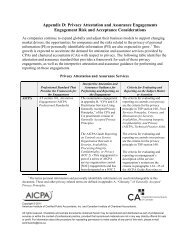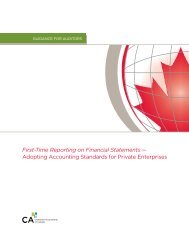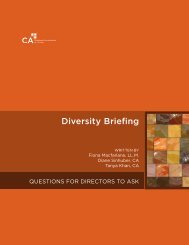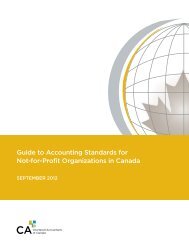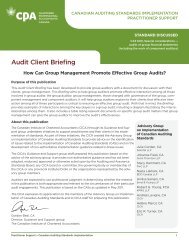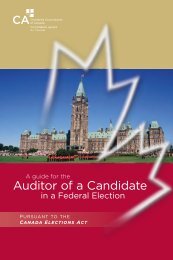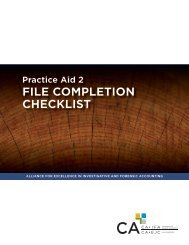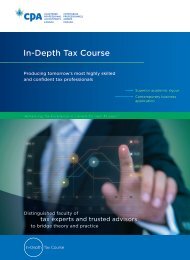20 Questions Directors of Not-for-Profit Organizations Should Ask ...
20 Questions Directors of Not-for-Profit Organizations Should Ask ...
20 Questions Directors of Not-for-Profit Organizations Should Ask ...
Create successful ePaper yourself
Turn your PDF publications into a flip-book with our unique Google optimized e-Paper software.
How to use this<br />
publication<br />
Each “<strong>20</strong> <strong>Questions</strong>” publication is designed to<br />
be a concise, easy-to-read introduction to an<br />
issue <strong>of</strong> importance to directors. The question<br />
<strong>for</strong>mat reflects the oversight role <strong>of</strong> directors,<br />
which includes asking a lot <strong>of</strong> questions. For each<br />
question, there is a brief explanatory background<br />
and some recommended practices.<br />
The “answers” or comments that accompany<br />
each question summarize current thinking on the<br />
issue and practices <strong>of</strong> not-<strong>for</strong>-pr<strong>of</strong>it governance.<br />
If your organization has a different approach, you<br />
are encouraged to test it by asking if it provides a<br />
valid answer to the question.<br />
There may be limitations on the ability <strong>of</strong> a<br />
particular board to follow all the recommended<br />
practices described in this document. The board<br />
may not be in a position to nominate a full slate<br />
<strong>of</strong> directors; directors may be inexperienced<br />
with governance assessment and may initially<br />
be unsure <strong>of</strong> the process; or it may be difficult<br />
to attract volunteer directors with the ideal<br />
combination <strong>of</strong> skills, qualities and experience.<br />
In addition, the committee structure <strong>of</strong> not-<strong>for</strong>pr<strong>of</strong>it<br />
boards may vary depending on the size<br />
and complexity <strong>of</strong> the organization. Nevertheless,<br />
progress towards practices suggested will<br />
improve the quality <strong>of</strong> governance within the<br />
organization and encourage further measures in<br />
the future.<br />
<strong>Directors</strong> coming from a <strong>for</strong>-pr<strong>of</strong>it business may<br />
find that their experience, although <strong>of</strong>ten helpful,<br />
may not always provide the best answers in the<br />
not-<strong>for</strong>-pr<strong>of</strong>it environment. The material in this<br />
document should help them decide how to adapt<br />
their experience to the not-<strong>for</strong>-pr<strong>of</strong>it realm. The<br />
important differences between the corporate and<br />
not-<strong>for</strong>-pr<strong>of</strong>it governance environments lie in:<br />
• The volunteer status <strong>of</strong> not-<strong>for</strong>-pr<strong>of</strong>it directors,<br />
which may affect motivation, commitment and<br />
board dynamic;<br />
• The absence <strong>of</strong> regulations requiring board<br />
assessment <strong>for</strong> NPOs; and<br />
• The diversity <strong>of</strong> ways in which not-<strong>for</strong>-pr<strong>of</strong>it<br />
directors can be appointed or elected, and the<br />
relative lack <strong>of</strong> control that an organization may<br />
have over their appointment and per<strong>for</strong>mance.<br />
Readers who want more details on specific topics<br />
may refer to the section on “Where to Find More<br />
In<strong>for</strong>mation.”<br />
Written by<br />
Richard Leblanc, CMC, JD, LLB, MBA, LLM, PhD<br />
Hugh Lindsay, FCA, CIP<br />
Project direction<br />
Beth Deazeley, LLB<br />
Principal, Risk Management and Governance<br />
CICA




